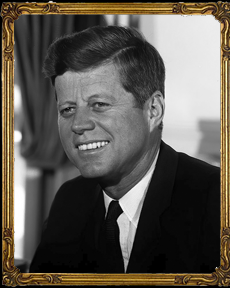
John Fitzgerald Kennedy
Term Date: 1961-1963
Political Party: Democrat
Vice President: Lyndon B. Johnson
Born Place: Brookline, Massachusetts
Born Date: May 29, 1917,
Died Place: Dallas, Texas
Died Date: November 22, 1963,
First Lady: Jacqueline Lee Bouvier
Children: 3
Parents: Joseph Patrick Kennedy, Rose Elizabeth Fitzgerald
Other Political Offices:
House of Representatives, Massachusetts 1947-1953
United States Senator, Massachusetts 1953-1961
Occupation before elected:
Author, soldier, public official
Brief History:
In August 2, 1943 when his PT boat PT109 was rammed and sunk by a Japanese destroyer, although it aggravated a previous back problem, Kennedy helped get the survivors to safety and later commanded PT59 in further engagements. In 1955 while he was recovering from a back operation, he wrote Profiles in Courage, which won the Pulitzer Prize in history and later spurred an award in 1989 to others who show quality of political courage and leadership. As a representative Kennedy was reelected in 1948 and 1950 and his views ranged from the policies of President Harry Truman and the Democratic party. On domestic affairs he went along with the policies in most matters, voting for slum clearance and low income public housing. He finally underwent several operations in October 1954 and February 1955 to his spine to try and end his history of back problems. John Kennedy became the first Roman Catholic President and was the youngest ever elected to the presidency.
His Inaugural Address was made famous by the lines: "Ask not what your country can do for you, ask what you can do for your country. When a force of anti Castro Cubans, trained and directed by the U.S. Central Intelligence Agency, was foiled in an attempt to land in Cuba at the Bay of Pigs it was a blow to his leadership, which he took full responsibility for. Kennedy was a strong advocate in the cause of equal rights and took a firm stance on it, calling for new civil rights legislation. Two of his programs were the Alliance for Progress and the Peace Corps which helped under developed countries. Another accomplishment was a nuclear test ban treaty in 1963 which helped ease cold war tensions. The U.S. space program was also accredited with advancing under his term. On November 22, 1963, Kennedy was shot to death while riding in a motorcade in Dallas, Texas. On November 29,1963 President Johnson appointed a commission, headed by Chief Justice Earl Warren, to hold an investigation into the assassination.
His Inaugural Address was made famous by the lines: "Ask not what your country can do for you, ask what you can do for your country. When a force of anti Castro Cubans, trained and directed by the U.S. Central Intelligence Agency, was foiled in an attempt to land in Cuba at the Bay of Pigs it was a blow to his leadership, which he took full responsibility for. Kennedy was a strong advocate in the cause of equal rights and took a firm stance on it, calling for new civil rights legislation. Two of his programs were the Alliance for Progress and the Peace Corps which helped under developed countries. Another accomplishment was a nuclear test ban treaty in 1963 which helped ease cold war tensions. The U.S. space program was also accredited with advancing under his term. On November 22, 1963, Kennedy was shot to death while riding in a motorcade in Dallas, Texas. On November 29,1963 President Johnson appointed a commission, headed by Chief Justice Earl Warren, to hold an investigation into the assassination.

